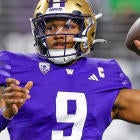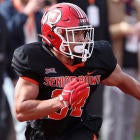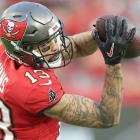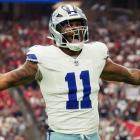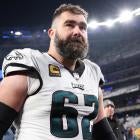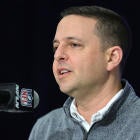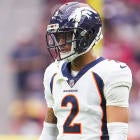The NFL will crown a champion on Sunday when the 49ers and Chiefs take the field for Super Bowl LIV. It's a matchup between Patrick Mahomes and one of the league's best defenses. But what about the other 10 teams that came up short this January?
This time a year ago, as the Patriots and Rams prepared for Super Bowl LIII, the Chiefs were sitting at home thinking about how excruciatingly close they came to reaching their first Super Bowl since the 1969 season after an overtime coin toss and an offside penalty cost them a spot in the championship. It always did feel like the Chiefs would be back and take the next step, seeing that they had the world's best quarterback in Mahomes and only needed to provide him with an adequate defense to give him the support he needed to carry the Chiefs to the Super Bowl -- which is why, at this point a year ago, I gave the Chiefs the best chance of winning Super Bowl LIV among the 10 teams that fell short in the postseason. Sure enough, the Chiefs upgraded their defense. Mahomes did the rest. And the Chiefs are one win away from immortality.
As we begin the two-week dead period before the Super Bowl, now's as good a time as ever to rank the 10 playoff teams that fell short this year by their chances of winning next year's Super Bowl. Before we begin, it's worth noting that every team's standing will undoubtedly change between now and September. We have no way to know how each team will behave in March. We don't know which teams will be big-time spenders in free agency to add to their rosters and bolster their chances of taking the next step. We don't know which teams will sit back in free agency and instead, run it back with what they've already got.
Working with the information available at this time, we begin in Buffalo.
Who will Tom Brady and Philip Rivers play for next season? And who should you bet on in Super Bowl LIV? Jason La Canfora and Kenny White join Will Brinson to break it all down on the Pick Six Podcast. Listen below and be sure to subscribe here for daily NFL goodness fired into your eardrums.
10. Bills
The argument in favor of the Bills winning the Super Bowl next season goes like this: Second-year quarterback Josh Allen already took a huge step forward in his development and can be expected to continue developing at a similar trajectory. The Bills' defense will remain one of the league's top units. And with the Patriots seemingly on the cusp of surrendering their stranglehold over the AFC East, it's the Bills best positioned to take their spot atop the division after a 10-6 season that included two narrow losses to New England.
Unfortunately for the Bills, Allen's development in Year 2 has been overstated. As I wrote back when all 12 playoff teams were still alive and I ranked Allen as the worst starting quarterback of the 12:
From last year to this year, his completion percentage improved by 6 percent (good!), he averaged 0.2 more yards per pass attempt (meh), his touchdown percentage rose by 1.2 percent (good!), his interception percentage declined by 1.8 percent (great!), and his passer rating climbed by 17.4 points (great!).
However, the advanced metrics are less kind to Allen. By both DYAR and DVOA, he finished the season ranked 27th -- one spot ahead of Mitchell Trubisky and one spot behind Andy Dalton. By total QBR, which factors in running (a real strength of Allen's), he finished the season ranked 26th -- one spot ahead of Case Keenum and one spot behind Jared Goff. Last season, Allen ranked 33rd, 33rd, and 26th in those respective categories.
It's true that Allen enjoyed a nice midseason stretch that culminated with a sweet performance in a Thanksgiving win over the Cowboys, but consistency on a throw-to-throw and game-to-game basis remains a problem.
Josh Allen will always have that Cowboys game pic.twitter.com/JJdTlb0hCu
— new-age analytical (@benbbaldwin) January 6, 2020
That doesn't mean Allen can't improve in Year 3. It just means he hasn't made the leap yet. And we can't presume he'll improve or become more consistent in 2020. The fact remains that the Bills have the worst quarterback of the 10 teams on this list.
Defensively, the Bills finished sixth in DVOA, third in yards allowed, and second in points allowed. It's a talented unit coached by Sean McDermott. They should remain good in 2020, assuming they can stay as healthy as they did in 2019. But injury luck tends to fluctuate on a year-to-year basis. Regression should be expected.
The Bills' defense stayed incredibly healthy this season, which is usually a key component in sustaining high-end play. Poyer, Hyde, T White, Wallace, Edmunds, Milano, Hughes, Murphy, Lawson, Alexander, Oliver, Lotulelei, Phillips all played 16+ games. Incredible.
— Mike Clay (@MikeClayNFL) January 7, 2020
Both of these factors make the Bills the team most likely to become next season's version of the Bears, a team that enjoyed a successful 2018 season with a second-year quarterback who improved marginally and an awesome defense that stayed healthy only to suffer a disappointing 8-8 follow up campaign because their defense regressed and their quarterback failed to make the leap.
Finally, there's the fact that the Bills play in the AFC East, meaning they'll need to vanquish the Patriots and eventually, the Chiefs in the playoffs. Nobody should be writing off the Patriots just because they fell short of expectations in 2019 (more on them further down below). Nobody should be expecting the Chiefs to disappear. Unless Allen improves mightily as a passer and the defense replicates its success, the Bills probably won't be able to hang with Mahomes. The future in Buffalo is brighter than it's been for decades, but they still have a ways to go to capture their first Super Bowl.
The best way the Bills can overcome the odds? Win big in free agency. With the fourth-most cap space, that can't be ruled out.
9. Titans
The Titans were probably the best story of the postseason. But they were only the best story of the postseason because they just barely snuck into the playoffs at 9-7 before earning huge road upsets over both the Patriots and Ravens. To put it another way, they were a great story because they weren't a great team that exceeded expectations.
Now, they'll head into the offseason needing to make multiple key decisions that will drastically impact their short- and long-term future.
Ryan Tannehill is an impending free agent. After Tannehill led the Titans to a 7-3 record in the regular season to push them into the playoffs with legitimately great quarterback play, the Titans can't afford to let him walk. They also probably shouldn't hand him a long-term deal considering this is the first time in Tannehill's eight-year career he's looked like a franchise-caliber quarterback. That's really the problem in all of this. For as great as Tannehill played this season, I don't know if we can expect him to repeat his performance in 2020. Tannehill led the league in completion percentage over expectation even though he averaged the third-most air yards per attempt and threw into tight windows at the sixth-highest rate, per Next Gen Stats. He deserves all the credit for doing so. But I'm not entirely sure it's sustainable, mainly because it's the first time he's done something like this in his career.
Derrick Henry is also an impending free agent. After Henry became the league's most dominant running back down the stretch, the Titans probably won't let him walk, but the Titans also shouldn't pay him Ezekiel Elliott money. That's not a shot at Henry. It's just the reality of the running back position in the NFL. Raheem Mostert, who went undrafted and got cut too many times to count before landing in San Francisco, just rushed for 220 yards and four touchdowns to send the 49ers to the Super Bowl. Paying a running back big money is not an efficient use of money. Unfortunately, as the Rams and Cowboys have demonstrated over the past couple years, teams often don't adhere to logic. It would be surprising if the Titans didn't give Henry a long-term deal. Assuming Henry will be back in 2020, nobody should expect him to have a bad follow up to an awesome 2019 season, but as their loss to the Chiefs proved, the Titans probably can't run the ball all the way to the Super Bowl -- not against the likes of Mahomes. As the 49ers proved, to make it to the Super Bowl with an offensive composed entirely of running plays, you also need an elite defense.
On that note, the Titans also need to replace their defensive coordinator after Dean Pees announced his retirement on Monday. He's not irreplaceable, but it is a tough loss. When Pees arrived in 2018, he inherited a unit that ranked 21st in DVOA and 17th in points allowed. This season, the Titans' defense ranked 16th in DVOA and 12th in points allowed one year after ranking 19th in DVOA and third in points allowed. The Titans also lost secondary coach Kerry Coombs to Ohio State.
The uncertainty heading into the offseason coupled with the fact that the Titans needed everything to go right for them to mount an incredible run that ended one game shy of the Super Bowl is why they find themselves near the bottom of the list. Kudos to Tannehill and Henry for carrying the team as far as they did, but I'm not entirely sure it's sustainable.
8. Texans
The Texans are ranked above the Titans because of one player: Deshaun Watson. Watson can't do it all by himself, which is why the Texans are still ranked near the bottom of the list, but he gives the Texans a chance.
But the Texans are unlikely to win the Super Bowl because the team doesn't have enough resources to give him the help he needs. Barring any trades, their first draft pick won't come until the second round. That's their only pick in the top 100. It's almost like having a general manger is important -- especially for a team with the league's 26th-ranked defense by DVOA and a bad pass-blocking offensive line.
Watson makes the Texans the favorites in the AFC South because he's the best quarterback in the division. But unless he gets some help, he can't be expected to win a Super Bowl entirely on his own. Do you trust coach/GM Bill O'Brien to get him that help? I don't.
7. Packers
One year after it claimed the Bears, the regression monster could be coming for the Packers following a 14-4 season (including the playoffs) that saw them post a 9-1 record in one-score games (also including the playoffs). Their point differential in the regular season was plus-63. For the sake of comparison, a 49ers team that posted the same record in the regular season had a plus-169 point differential. Based on their point differential, the Packers' expected win total was 9.7.
They overachieved.
Green Bay and the worst 13-3 (or better) teams in DVOA history (since 1985). The 1999 Colts are the only 13-3 team to come out worse than this year's Packers by DVOA. pic.twitter.com/YEOrCiAmTM
— Aaron Schatz 🏈 (@FO_ASchatz) December 30, 2019
After their (second) blowout loss to the 49ers on Sunday, Aaron Rodgers indicated that he didn't think the gap between the Packers and the 49ers was that substantial. All of the evidence indicates otherwise.
To offset regression, the Packers can sign difference makers in free agency one year after they did well to add the likes of Adrian Amos, Za'Darius Smith, and Preston Smith to a defense that proceeded to make the leap. They can also improve offensively. The Packers' defense improved, going from 29th to 15th in DVOA. Their offense did not improve, going from seventh to eighth, even though Matt LaFleur was hired to replace Mike McCarthy because he was supposed to bring an innovative offense to Green Bay. More concerning is that Rodgers submitted another underwhelming season by his standards. The advanced metrics continue to indicate that Rodgers is well past his prime. We kept waiting for the Packers' offense to catch fire, but it just never did. We kept waiting for Rodgers to look like the all-time great quarterback he once was, but he never did. At age 36, it's likely that this is the new normal for Rodgers.
For the Packers to get over the hump after losing their third NFC title game over the past six seasons, they either need Rodgers to return to such great heights or they need the team around him to improve now that he's no longer good enough to mask all of their flaws.
6. Vikings
There's bound to be some outrage with the Vikings ranked above the Packers considering the Packers swept the season series and made it one round further than the Vikings, but the Vikings finished the season with a far better point differential (plus-104 compared to plus-63), more expected wins (10.7 compared to 9.7), and a better ranking in DVOA (seventh compared to 10th), all of which are typically good predictors of future success.
Cousins actually outperformed Rodgers over the course of the season by posting career-highs (not counting the first three seasons of his career, when he hadn't yet emerged as a full-time starter) in touchdown percentage (5.9), yards per attempt (8.1), and passer rating (107.4). He ranked seventh in DYAR, 10th in DVOA, and 13th in total QBR. Perhaps most importantly, even though the season ended with a stinker in San Francisco (something he has in common with Rodgers), Cousins actually managed to get the monkey off his back by leading the Vikings to some big wins in big games -- most notably, an upset of the Saints in the first round of the playoffs.
A 3-4 record in one-score games (including the playoffs) hurt the Vikings as much as the Packers' success in one-score games helped them, but as previously mentioned, that is something that tends to fluctuate on a year-to-year basis. The Packers can't expect to get as lucky. The Vikings shouldn't expect to be as unlucky.
That doesn't mean the Vikings don't have flaws. They desperately need to improve their pass protection. But from top to bottom, they have the best team in the NFC North.
The bad news and ultimately the reason why they're stuck on the bottom half of this list? They're dead last in available cap space, making it difficult for them to fix those flaws.
5. Seahawks
This is all about Russell Wilson. Even though he's hamstrung by a coaching staff hellbent on establishing the run, Wilson is great enough to lead the Seahawks to a second championship. The hope is that the Seahawks' coaching staff realizes the errors in their ways and starts designing their offense around one of the league's best quarterbacks, but until that happens, it's safer to assume the Seahawks will trot out another run-heavy offense that requires Wilson to rescue them late in games. It's a testament to Wilson's greatness that the Seahawks rank this high.
What's concerning, of course, is that the Seahawks posted an 11-3 record in one-score games (including the playoffs). As mentioned in the Packers' section, that is due for some major regression. The difference between the Packers and Seahawks? The Seahawks still have a quarterback playing at an MVP level. That matters more than anything else in the NFL. By DVOA, the Seahawks finished eighth, ranking one spot behind the Vikings. I think they're remarkable close to each other -- which is backed up by their 37-30 game back in Week 13. I'd be fine with anyone wanting to flip the two teams.
Tough decisions loom for the Seahawks' front office, with a number of key players -- like Jadeveon Clowney -- hitting free agency. The good news is that they have plenty of available cap space. Residing in the ultra-competitive NFC West won't make things easy for them. But the Seahawks did go 1-1 against the 49ers, winning in overtime and losing by one lousy yard. The 49ers are more talented, but Wilson gives the Seahawks a chance to surpass them in 2020.
4. Eagles
The Eagles fell short of expectations in 2019 by winning only nine games and bowing out in the first round of the playoffs, but merely making it into January after suffering as many injuries as they did over the course of the season and hanging tough against the Seahawks with Josh McCown -- who was playing through a torn hamstring! -- at quarterback can both be considered achievements.
Assuming the Eagles' injury luck improves, they already almost have a Super Bowl-caliber roster -- which is why I picked them to make it to the Super Bowl before the season. Even with all of the injuries, they still ranked 11th in DVOA. They also happen to reside in the NFC East, the worst division in football, which could give them an easy path to the playoffs. GM Howie Roseman has demonstrated he's willing to be aggressive to build a contender, so don't be surprised if the Eagles make upgrades this offseason. Cap space shouldn't be an issue.
Above all else, the Eagles just need to get healthy. If they do, I think we'll see a major improvement in 2020.
3. Patriots
For all of the talk about this maybe being the end of the Patriots' dynasty, they still went 12-4 with the league's second-best point differential (plus-195). Let's not act like the Patriots were bad in 2019. They were disappointing by their standards, but their standards aren't the same as the rest of the league's.
While Tom Brady appears to be very willing to explore his options in free agency, until he signs elsewhere, I'm not going to assume he's leaving the Patriots after spending the past 20 years in New England with Bill Belichick. Despite the reported friction between the quarterback and coach over the past few years, the two of them have been together for six championships. It wasn't long ago that the Patriots traded away Jimmy Garoppolo, who appeared to be Brady's successor. I'm not saying Brady won't leave. But until it happens, I'm going to assume Brady will be back for another season. And for what it's worth, if Brady were to depart, the Patriots would have options. This just happens to be an offseason where a ton of quarterbacks might be available, from Andy Dalton to Philip Rivers to Jameis Winston to Marcus Mariota to Teddy Bridgewater. Would anyone be that surprised if Belichick managed to turn Dalton into a playoff winner?
Really, Belichick is the key in all of this. He lost his top defensive lieutenant for a second straight offseason and he still had the Patriots' defense at the top of the table in 2019. He of all people understands the Patriots' offense needs to improve in 2020 if he's going to capture another Super Bowl. I think we're going to see the Patriots get aggressive in the offseason to bolster their offense. I don't think he wants to undergo a slow and methodical rebuild considering where he's at in his career.
And let's not forget about the Patriots' injury luck. They were shorthanded on offense for much of the season, losing key players up front and fullback James Develin, who is a key component in their running game. Assuming the Patriots re-sign Brady, get healthy, add reinforcements, and maintain their defensive success under the guidance of the best coach in NFL history, the Patriots should be back playing meaningful football in January.
They've won three Super Bowls over the past six seasons. One bad season by their standards that still resulted in a playoff berth won't be enough to get me to jump off the ship. But the presence of Mahomes, The Prince That Was Promised, in the AFC pushes the Patriots to No. 3 behind the Saints, who have the good fortune of residing in the NFC, where they'll avoid Mahomes until February.
2. Saints
The Saints aren't that different from the Patriots. They've got a great coach in Sean Payton, an aging all-time great quarterback in Drew Brees, a good defense, and their season ended with a disappointing upset in the playoffs.
But the Saints are entering a less uncertain offseason. Payton has indicated that Brees should return. On the off chance he doesn't, the Saints can always turn to Bridgewater, who posted a 5-0 record filling in for Brees. Brees didn't play well in the playoff loss to the Vikings, but unlike 2018, he finished the 2019 regular season on a tear, helping to assuage my concerns over how gracefully he's aging. Their defense will likely bring back all of their key components after a season that saw them rank just outside the top-10 in DVOA. By overall DVOA, the Saints ranked fourth -- one spot ahead of the 49ers and one spot behind the Patriots.
The Saints are running out of time to win their second Super Bowl with Brees, but their window hasn't closed yet.
1. Ravens
Let's not overreact to one horrible performance in the playoffs that ended their season prematurely. Everything that could go wrong did go wrong in a loss to the Titans, but that doesn't invalidate the success they found this season.
The Ravens were the best team in football for most of the season before going one-and-done in the playoffs. They won 14 games. They outscored their opposition by a league-high 249 points. They ranked first in DVOA by a wide margin. Their quarterback, Lamar Jackson, is going to capture MVP honors after his first full season as a starter. Most of their important pieces will be back in 2020. They didn't lose any assistant coaches -- most notably, offensive coordinator Greg Roman and defensive coordinator Don Martindale -- during hiring season. The Ravens are going to run it back in 2020. That should terrify the rest of the NFL.
They also reside in the AFC North, where the Bengals are entering a full-on rebuild, the Steelers are depending on Ben Roethlisberger to make a full recovery from major elbow surgery at the age of 38, and the Browns are still the Browns. The Ravens should be favored to win the division again. Along with the Chiefs, they should be favored to earn a first-round bye, which will give them a leg up on the rest of the field.
The key in all of this is that Jackson should continue to grow. Look at how much progress he made after only one offseason in Roman's system. A young receiver group that featured two rookies in Marquise Brown and Miles Boykin should improve. Their defense already improved substantially over the course of the season.
Perhaps the biggest factor is John Harbaugh, a coach who has embraced analytics and adapted to modern times. Don't overlook his importance, similar to how Belichick always puts the Patriots in the best possible position. Harbaugh and the Ravens are at the forefront of innovation. I can't wait to see what they come up with next after designing the league's most prolific rushing attack in 2019. This is one of the league's smartest teams with one of the league's deepest rosters, from the quarterback to the kicker. Assuming they stick to the process they started in 2019, even better results could be on the horizon.














